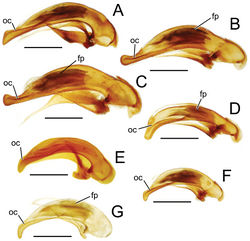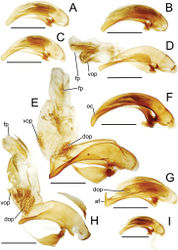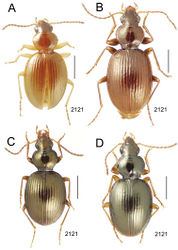Mecyclothorax pirihao\according to Liebherr 2013
| Notice: | This page is derived from the original publication listed below, whose author(s) should always be credited. Further contributors may edit and improve the content of this page and, consequently, need to be credited as well (see page history). Any assessment of factual correctness requires a careful review of the original article as well as of subsequent contributions.
If you are uncertain whether your planned contribution is correct or not, we suggest that you use the associated discussion page instead of editing the page directly. This page should be cited as follows (rationale):
Citation formats to copy and paste
BibTeX: @article{Liebherr2013ZooKeys322, RIS/ Endnote: TY - JOUR Wikipedia/ Citizendium: <ref name="Liebherr2013ZooKeys322">{{Citation See also the citation download page at the journal. |
Ordo: Coleoptera
Familia: Carabidae
Genus: Mecyclothorax
Name
Mecyclothorax pirihao Liebherr, 2012b: 88 – Wikispecies link – Pensoft Profile
Identification
This Mecyclothorax globosus group species with setal formula 2121 can be diagnosed by the pronotal shape, with the very constricted base, obtuse-rounded hind angles, and lateral margins moderately divergent immediately before, and then more angularly divergent further anterad the hind angles (Fig. 48B). The discal elytral striae are smooth to minutely punctate at their depths in the basal half of the elytra. Striae 2–6 are absent from the elytral base, not continuous to the elytral basal groove. The elytra are narrow basally, the humeri angulate and proximate; MEW/HuW = 2.42–2.56 (n = 5). The frons and vertex are covered with an indistinct transverse mesh, sculpticell breadth 2–3× length, and the pronotal disc bears a more elongate mesh, sculpticell breadth 3–4× length, the areas of mesh mixed with glossy portions. The discal elytral intervals are lined with an elongate transverse mesh, sculpticell breadth 3–5× length, intermixed with areas of transverse lines. The male aedeagal median lobe is slender, evenly curved from basal bulb to ostial apex (Fig. 47F), with the apex variably displaced apically along the dorsal margin and narrowly downturned ventrally to a tightly rounded tip (Figs 3G, 47F). The ostial canal is moderately elongate and parallels the dorsal margin. The male aedeagus is very similar to that observed in males of Mecyclothorax bryobius (Fig. 19E), that species a member of the Mecyclothorax altiusculus species group. Nevertheless the key pronotal characters of narrow sinuate lateral margins place Mecyclothorax pirihao here. Phylogenetic analysis incorporating information from all characters will assess this incongruence. Standardized body length 4.2–5.0 mm.
Distribution and habitat
This species is recorded from 880–1110 m elevation on Mont Mauru. Most of the specimens have been collected in association with ferns, either by beating or through application of pyrethrin fog. Only 2 of the 22 known specimens were collected by beating flowering plants; a mixed beating sample of Melicope, Myrsine, and Weinmannia.
Taxon Treatment
- Liebherr, J; 2013: The Mecyclothorax beetles (Coleoptera, Carabidae, Moriomorphini) of Tahiti, Society Islands ZooKeys, 322: 1-170. doi
Images
|
- ↑ Perrault G (1986) La faune des Carabidae de Tahiti VII. révision du genre Mecyclothorax (Sharp) (Psydrini). 2. les groupes de M. striatopunctatus n. sp., M. dannieae Perrault, M. marginatus Perrault et M. viridis Perrault (Coleoptera). Nouvelle Revue d’Entomologie (NS) 3: 439-455.
![Figure 3. Male aedeagal median lobe and associated parameres, Mecyclothorax spp., right lateral view; scale bars 0.5 mm A Mecyclothorax striatopunctatus paratype (MNHN) (apex of dissection damaged and lost; apex depicted by detail drawing [Perrault 1986[1], fig. 23]) B Mecyclothorax bougainvillei holotype C Mecyclothorax mahina holotype D Mecyclothorax poria holotype E Mecyclothorax villiersi F Mecyclothorax taatitore paratype (CUIC) G Mecyclothorax pirihao paratype (CUIC) H Mecyclothorax bryobioides Abbreviations: at apical tooth dop dorsal ostial microtrichial patch fp flagellar plate lp left paramere oc ostial canal pa parameral articulation rp right paramere vop ventral ostial microtrichial patch.](https://species-id.net/o/thumb.php?f=ZooKeys-322-001-g003.jpg&width=183)


